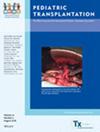"要么接受,要么放弃瑞士小儿心脏移植申请分析
IF 1.2
4区 医学
Q3 PEDIATRICS
引用次数: 0
摘要
背景瑞士缺乏供体心脏,尤其是用于儿童受体的供体心脏。方法 在瑞士器官移植数据库 "瑞士器官分配系统 "中搜索了 2015 年至 2020 年间所有来自瑞士和外国的 16 岁以下捐献者的心脏。结果 瑞士三家儿童心脏中心和国外捐献者采购组织共获得136个器官。其中,26/136(19%)个器官被接受并移植:18个心脏在瑞士移植,其中13个在国外。拒绝的原因有:(1) 血型或体重不匹配,没有匹配的受体,占 89.4%;(2) 医疗原因,即器官过于边缘化,不适合移植,占 7.4%;(3) 后勤原因,占 1.4%;(4) 其他原因,占 1.8%。有五个器官在瑞士被一个中心拒绝,但后来被另一个中心接受并成功移植。来自瑞士境外的心脏移植数量明显少于瑞士心脏(n = 16/120 vs. 10/16,p < .001)。因医学原因而拒绝捐献心脏的情况很少。对于选定的患者,似乎有理由更慷慨地接受捐赠。瑞士接受了大量的外国捐赠,但其接受率低于瑞士的捐赠率。本文章由计算机程序翻译,如有差异,请以英文原文为准。
“Take it or leave it”: Analysis of pediatric heart offers for transplantation in Switzerland
BackgroundThere is a shortage of donor hearts in Switzerland, especially for pediatric recipients. However, the rate and reason for refusals of pediatric donor hearts offered in Switzerland has not been systematically analyzed.MethodsThe national transplant database, Swiss Organ Allocation System, was searched for all hearts from Swiss and foreign donors younger than 16 years from 2015 to 2020. The numbers of accepted and refused hearts and early outcome were assessed, and the reasons for refusal were retrospectively analyzed.ResultsA total of 136 organs were offered to the three Swiss pediatric heart centers and foreign donor procurement organizations. Of these, 26/136 (19%) organs were accepted and transplanted: 18 hearts were transplanted in Switzerland, and 13 of these were foreign. Reasons for refusal were (1) no compatible recipient due to blood group or weight mismatch, 89.4%; (2) medical, meaning organ too marginal for transplantation, 7.4%; (3) logistic, 1.4%; and (4) other, 1.8%. Five organs were refused in Switzerland by one center but later accepted and successfully transplanted by another center. Hearts from outside Switzerland were transplanted significantly less than Swiss hearts (n = 16/120 vs. 10/16, p < .001).ConclusionThe most common reason for refusing a pediatric donor heart is lack of compatibility with the recipient. Few hearts are refused for medical reasons. A more generous acceptance seems to be justified in selected patients. Switzerland receives a high number of foreign offers, but their rate of acceptance is lower than that of Swiss donations.
求助全文
通过发布文献求助,成功后即可免费获取论文全文。
去求助
来源期刊

Pediatric Transplantation
医学-小儿科
CiteScore
2.90
自引率
15.40%
发文量
216
审稿时长
3-8 weeks
期刊介绍:
The aim of Pediatric Transplantation is to publish original articles of the highest quality on clinical experience and basic research in transplantation of tissues and solid organs in infants, children and adolescents. The journal seeks to disseminate the latest information widely to all individuals involved in kidney, liver, heart, lung, intestine and stem cell (bone-marrow) transplantation. In addition, the journal publishes focused reviews on topics relevant to pediatric transplantation as well as timely editorial comment on controversial issues.
 求助内容:
求助内容: 应助结果提醒方式:
应助结果提醒方式:


